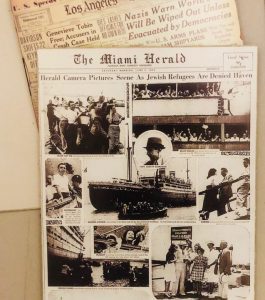The Influence of the Press During the Holocaust
Zoe Wright, Public Relations Intern
Deborah E, Lipstadt once said, “The press may not determine what the public thinks, but it does influence what it thinks about.” The influence of the press and media has always shaped discussion. In addition, without the press, it would be very difficult to know what goes on halfway across the world. This did not change during the Holocaust.
Unfortunately, the coverage of the persecution of the Jews during the Holocaust was not the priority of many reporters. Although the press did not entirely ignore the persecution of Europe’s Jewish population, they did cushion the shock factor of the Holocaust with qualifying words such as “exaggerated” and “unverifiable.” This caused many people to be unaware of what was truly happening in Europe.
The Nazis were also strategic in their treatment of the American press because they realized how effective this could be in downplaying the terrible actions they were committing. Therefore, correspondence with the American press was initially rather cordial. Historian Paul Wieser said that “the press coverage of the Nazi persecution of the Jews paralleled U.S. government policy on refugee rescue, which was no treated as an issue of primary importance.”
A few civilians knew they had to take matters into their own hands. On February 16, 1945, a group of Palestinian Jews known as the “Bergan Boys,” placed an advertisement in The New York Times offering “For Sale to Humanity / 70,000 Jews / Guaranteed Human beings at $50 a Piece.” The advertisement was a response to the Romanian government’s offer to transport that many Jews anywhere in the world with payment from a transport tax. The U.S. and Great Britain rejected the offer. Even still, this ad would have been confusing to people who did not have the full story of what was going on in the other side of the world since there was not immense coverage.
In terms of German press, the Nazis had total control of German information through propaganda and state censorship. A writer would face prison if they were caught describing the violations of human rights occurring in Europe.
One brave writer, Dorothy Thompson, took risks to expose the truth of Nazi Germany. She was an influential reporter who served as the New York Post’s Berlin bureau chief. She was the first American to be expelled from Germany for covering the actions of Hitler. In 1931, Thompson interviewed Hitler. She wrote a book based on the interview titled, I Saw Hitler. She warned the public of how dangerous he could be as German Chancellor. In 1934, a year after Hitler took control, it was requested that she leave Germany. The controlling regime did not want any negative attention or call for action.
Today, it is important for the press to be aware of the strong influence they have over people’s opinions and knowledge of current events. To work for the press comes with great responsibility. It is essential reporters stand up for what is right as they have the power to give a voice to the voiceless.
To learn more about press coverage during the Holocaust, please visit The Florida Holocaust Museum. On the first floor in our permanent exhibition, you will find more information about the influence of the press during the Holocaust.

